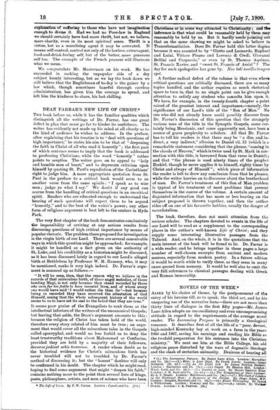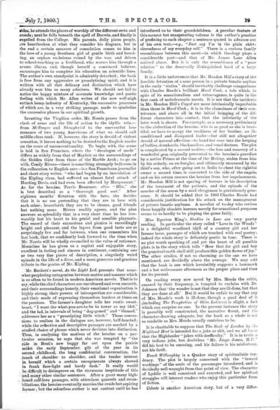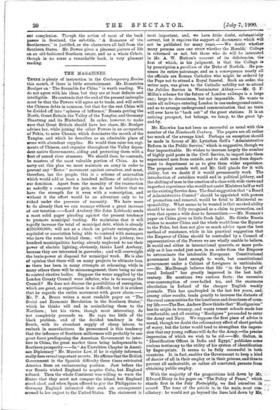NOVELS OF THE WEEK.*
ALIKE by his choice of theme, by the postponement of the entry of his heroine till, so to speak, the third act, and by his unsparing use of the narrative form—there are not more than thirty lines of dialogue in the first fifty pages—Mr. James Lane Allen adopts an unconciliatory and even uncompromising attitude in regard to the requirements of the average novel reader. The Increasing. Purpose is primarily a theological romance. It describes first of all the life of a " poor, devout, high-minded Kentucky boy at work on a farm in the years 1866 and 1867, saving his earnings and reading his Bible as the twofold preparation for his entrance into the Christian ministry." We next see him at the Bible College,. his old religious peace disturbed by the wars of dogmatic theology and the clash of sectarian animosity. Desirous of hearing all • (1.) The Increasing Purpose. By James Lane Allen. London': Macmillan and Co. (68.]—(2.) BM: a Love Idyll. By Frank Norris. London : Grant Richards. [Ss. 6d.]—(3.) As the Light Led. By JaMes Newton Baskett. London : Macmillan and Co. [6s.1--(4.) Caged: by Head= London : ISrard, Lock. and Co. [6s.]—(5.) Studies in Lore. By Maude Egerton King: London : .1. M. Dent and co. [is. 6e1.1.---(6.) The Temptation of Olire Latimer. T. Meade. London : Hutchinson and Co.- (6&]—(7.) The- Saekof London os the Righland Boa: a Romance of the Period. By Jingo Jones, M.P. London : Simpkin, Marshalloind Co. [es.]—(5.) Enoch Willoughby. By James A. Wickersham. London : Downey and Co.. (68.]—(11.) celeste. By wanner Downe. London : C. A. Pearson. [6s.] 'idea, he attends the places of worship of the different sects and creeds; next he falls beneath the spell of Darwin, and finally is expelled from the College. His parents, dully pious people, are heartbroken at what they consider his disgraee, but in the end a certain measure of consolation cornea to him in the love of a young Southern girl of gentle .birth and breed- ing, an orphan ex-heiress ruined by the war, and driven to school-teaching as a livelihood, who nurses him through a severe illness, and, though herself a convinced believer, encourages him to complete his education on scientific lines. The author's own standpoint is admirably detached ; the hook is free from any aggressive or proselytising spirit, and it is written with all that delicacy and distinction which have already won -him so many admirers. We should not fail to notice the happy mixture of accurate knowledge and poetic feeling with which Mr. Allen writes of the now well-nigh extinct hemp industry of Kentucky, the successive processes of which are, in a very striking passage, made to symbolise the successive phases in our spiritual growth.
Inverting the Virgilian order, Mr. Norris passes from the clash of arms and the life of action to the idyllic vein,— from .3fcTeag az and Shanghaied to the uneventful love romance of two young Americans of what we should call middle-clasa rank. If, however, the story is devoid of violent sensation, it leaves nothing to be desired to the English reader on the score of unconventionality. To begin With, the scene is laid in San Francisco, where the " decalogue of mode" differs as widely from that of Mayfair as the surroundings of the Golden Gate from those of the Marble Arch ;- to go on With, Condy Rivers—there is something strangely ludicrous in the.collocation to English ears--4s a San Franciscan journalist and short-story writer, "who had begun by an inoculation of the Kipling virus, had suffered an almost fatal attack of Harding Davis, and had even been affected by Maupassant." As for the heroine, Travis Bessemer. alias " Blix," she is best described as a " thorough good sort.." After eighteen months' flirtation with the hero, she decides that it is no • use pretending that they are in love with each other; henceforth they are to be chums, good friends but nothing more. Rivers readily agrees, and the plan answers so splendidly that in a very short time he has irre- vocably lost his heart to his genial and sensible playmate. The record of their excursions and picnics is exceedingly bright and pleasant, and the lapses from good taste are so surprisingly few and far between, when one remembers his last book, that we confidently look forward to the time when Mr. Norris will be wholly reconciled to the value of reticence. Meantime he has given us a capital and enjoyable story, excellent in feeling and sincere in sentiment, containing one or two very fine pieces of description, a singularly weird episode in the life of a diver, and a most generous and gracious tribute to the genius of Mr. Kipling.
. -Mr. Baskett's novel, As the Light Led, presents that some- what perplexing antagonism between matter and manner which is so often to be found in modern American novels. That is to say, while the chief characters are uncultured and even uncouth, and their surroundings homely, their emotional organisation is highly strung, their powers of introspection are considerable, and their mode of expressing themselves borders at times on the precious. The farmer's daughter tells her rustic sweet- -heart, "I want the what-you-are-to-be to tower as my idol," and the lad, in intervals of being " dog-goned" and " blamed," .addresses her as a "proselyting little witch." These conces- sions to• realism in the dialogue are, however, half-hearted; while the reflective and descriptive passages are marked by a studied choice of phrase which never deviates into distinction. Thus, in analysing the motives of the heroine on a par- tieular occasion, he says that she was tempted by " the $de in -Bent's new buggy far out upon the prairie -midst- the _early September_ gilt_. of . the year in its second 'childhood, the long. con.ficlential._ conversation, the .froneh of shoulder to shoulder, and the tender interest in herself . which a certain unregenerate always showed in frank fice-light and hardy dash." It really would be difficult to disimprove on the strenuous ineptitude of this and many other similar sentences. After a great many high- . toned calf-love passages, with attendant quarrels and recon- ciliations, the heroine eventually marries the crude but aspiring farmer; but the relentless author is not content until he has introduced us to their grandchildren. A peculiar- feattne of this earnest but exasperating volume is the author's practice of prefixing to each chapter a sentence quoted in advance out of his own text,—e.g., "Just say I'm in the plain shirt- sleevedness of my everyday self." There is a curious famil,i resemblance between this novel—in which theology plays a considerable part—and that of Mr. James Lane Allen noticed above. But it is only the resemblance of a " pool' relation " to the deservedly distinguished head of a large It is a little unfortunate that Mr. Headon Hill's story of-the forcible detention of a sane person in a private lunatic asylum in the early " sixties" should inevitably challenge comparisons with Charles Reade's brilliant Hard Cash, a tale which, in spite of its sensationalism and extravagance, is quite in the first rank of melodramatic novels. It is not that the incidents in Mr. Headon Hill's Caged are more intrinsically improbable than those in Hard Cash ; it is in the clumsiness of their con. trivance, and above all in the initial bringing of the dif- ferent characters into contact, that the inferiority of the later work is shown. For example. as a necessary preliminary to the abduction of the heroine, who is as good as she is beau- tiful, we have to accept the readiness of her brother, an ill- conditioned and dissipated loafer—but still not altogether devoid of natural affection—to hand her over into the keeping of bullies, drunkards, blackmailers, and venal doctors. The plot is complicated by a second motive,—the loss and recovery of a wonderful gem originally presented to the heroine's guardian by a native Prince at the time of the Mutiny, stolen from hint by his orderly, an ex-burglar, and ultimately recovered by the thief's son, who, after going out to India to cheat the rightful owner a second time, is converted to the side of the angels, and on his return rescues the heroine from her imprisonment. Mr. Headon Hill is not sparing of horrors in his description of the treatment of the patients, and the episode of the murder of the nurse by a mad clergyman is gratuitously grue- some. It should be added that in 1863 Charles Reads had considerable justification for his attack on the management of private lunatic asylums. A novelist of to-day who revives these happily obsolete horrors merely for sensational purposes seems to us hardly to be playing the game fairly.
Miss Egerton King's Studies in Love are very pretty reading. In particular the story called "Love in the Woods" is a delightful woodland idyll of a country girl and her farmer lover, passages of which are touched with real poetry; indeed the whole story is delicately poetic in tone. There is no plot worth speaking of, and yet the heart of all possible plots is in the story which tells " How that for girl and bob the punctual earth shall still produce this golden flower of joy!' The other studies, if not so charming as -the one we have mentioned, are decidedly above the average. We may add that the book is one -which irresistibly suggests a • hammock and a hot midsummer afternoon as the proper place and time for its perusal.
On reading every new novel by Mrs. Meade the critic, amazed by their frequency, is tempted to exclaim with Dr. Johnson that the wonder is not that they are ill-done, but that they are done at all.' . But it would be unfair to say that any of Mrs. Meade's work is ill-done, though a good deal of it (including The Temptation of Olive Latimer) is slight, a fact which can surprise no one. In the present instance the story is passably well • constructed, the narrative fluent, and the character-drawing adequate, but the book as a whole is not so readable as Mrs. Meade usually contrives to be.
It is charitable to suppose that The Sack of London by Ike Highland Host is intended for a joke or skit, and we all knuw that the Highlander "jokes with deefficulty." It is in truth a very tedious joke, but doubtless "Mr. Jingo Jones, M.P. " did his best to be amusing, and his failure is his misfortune, not his fault.
Enoch Willoughby is a Quaker story of spiritualistic ten- dency. The plot is largely concerned with the "inward workings" of the souls of the personages introduced; and is decidedly well wrought from that point of view. The character of Lyddie is well conceived and executed, and her spiritual struggles will interest readers who enjoy this particular form of fiction.
Celeste is another American story, but of a very differ-
eat complexion. Though the action of • most of the book passes in Scotland, the •sub-title, • " A Romance of the Southerners," is justified, as the . characters all hail from the Southern States. - Mr. Downe gives a pleasant: picture of life on an old-fashioned Southern estate, and as a whole Celeste, though in no sense a remarkable book, is very pleasant reading.












































 Previous page
Previous page